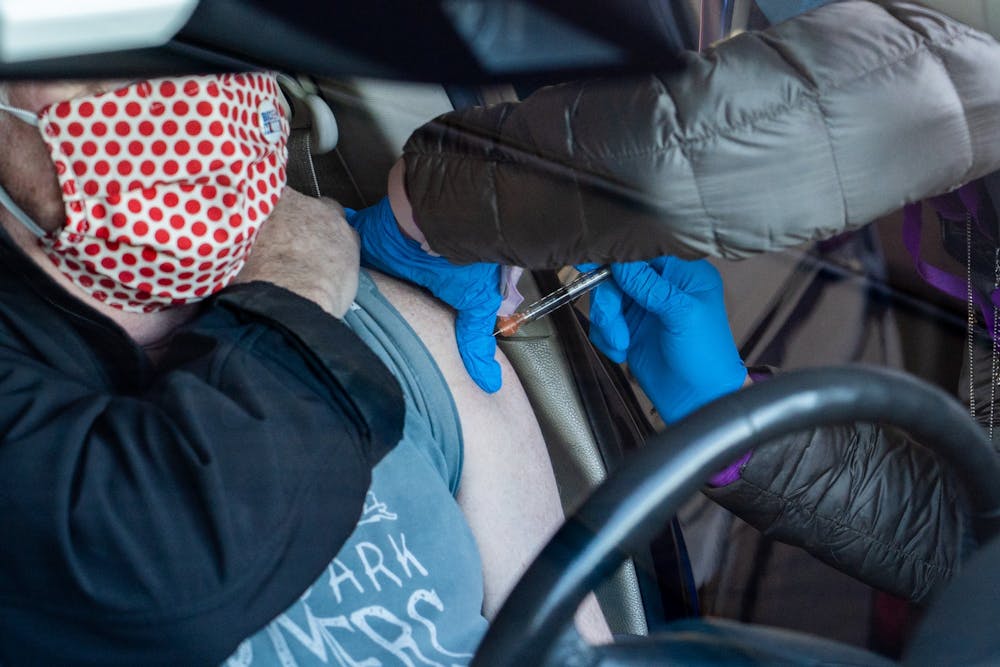A record number of people have traveled over the Easter weekend. Are you at all concerned about a surge in cases here on campus with students traveling and people gathering for the holiday?
The surge will happen. It usually takes place about two weeks after the travel. So, while it was nice that our numbers are trending down now, they’re probably going to go up again later in April. The recent surge we had is because of travel over this and [St.] Patrick’s Day, a couple of break days. We expect this.
As more people are getting vaccinated, some are reporting mild symptoms after getting their first and second doses of the vaccines. How do you recommend people treat these symptoms, and is there anything people should not do to treat symptoms?
Anytime you go for a vaccine, no matter where you go for it, you should actually be given a handout on what to expect from the vaccine because most people do get some symptoms, particularly after the second dose — or even after the first dose if you’ve had COVID yourself. If the symptoms you are getting aren’t on the sheet, or you have any worries, that’s when you contact your healthcare provider. The most important thing is don’t take Tylenol or ibuprofen before you get the vaccine. There is some suggestion that taking those medications before you’re vaccinated may blunt the immune response. It’s perfectly okay to take them afterwards and to help with all of the symptoms, and there’s no reason not to take whatever medication you normally take for aches and pains and chills and headaches. Just don’t take them before you go into the shot.
Is the university seeing any cases in people who have received their first dose of the vaccine?
Yes, there are some, and certainly we have a number of people in quarantine who have had one dose of the vaccine already, but what people need to know is there are two doses for a reason. It takes time to build up immunity, which is why it’s 14 days after that second dose or after your Johnson & Johnson dose if you get the single one before you can be regarded as immune. That’s not unique to COVID-19 vaccines. We remind people every year that the flu vaccine takes two weeks to work, and you can catch the flu … before that two weeks has actually elapsed.
WATCH THE INTERVIEW:
The university has announced that fully vaccinated students are exempt from testing and quarantining if they are in close contact for the next 90 days after they get their vaccine. Can you explain from a medical standpoint the reasoning behind these changes?
Well the reasoning behind that is, that’s basically the CDC guidelines. Until last week, the data only showed that immunity lasted for 90 days. We now have good data showing that the Pfizer vaccine certainly will give immunity — pretty decent immunity — for at least six months. We know that vaccines aren’t perfect. We know that if you’re vaccinated, you’re not going to die from COVID, and you probably won’t end up in a hospital. By following the exemptions as outlined by the CDC, it’s a way of saying, ‘OK, we know things aren’t perfect, but we’re working with you to be realistic, and we know that as a student or faculty or staff person, you’re getting the vaccine, and you should get some sort of benefit from getting it.’ Otherwise, what’s the point in having the vaccine? And that’s why we’re following CDC guidelines.
What can students expect the fall semester to look like?
The goal for fall semester would basically be to go, well, certainly not back to pre-pandemic because we can’t predict that everything’s going to be fine by then. But I can tell you that the goals for fall semester is a much more normal experience on campus. Hopefully, the amount of physical distancing may be able to be reduced. I’m using a lot of ‘hopefully’s’ and ‘maybe’s’ here because this is all up in the air. If we get another surge in two weeks that doesn’t come down over the summer, who knows what the fall will be like? The planning is for a best case scenario and a ‘what if things are still the same as they are now, if not worse’ scenario.
Do you think students should be required to be vaccinated in the fall?
I think the whole issue about requiring vaccines is a difficult one. It’s not a yes or no answer. It’s particularly difficult with a vaccine that is relatively new and has emergency use authorization. Currently hospitals are not mandating the vaccine for their staff. I know some universities in the country are planning to mandate the vaccine. I think every university needs to look at their own population, what the risks are for that population and what the voluntary uptake of the vaccine is. Medically, there’s no one answer because every individual is different.
Looking ahead to graduation, what precautions do you think students and family members should take as this very exciting celebration approaches?
Really very, very straightforward. For students, I would strongly recommend getting vaccinated, probably with the Johnson & Johnson one because it means you’re relatively immune much faster. For family members planning to come down for graduation again, vaccinations are important. If you choose not to be vaccinated, then 14 days of self-quarantine is a good way to make sure you’re not going to bring the coronavirus to campus and infect other people who may suffer from a lot more severely than you do yourself.


